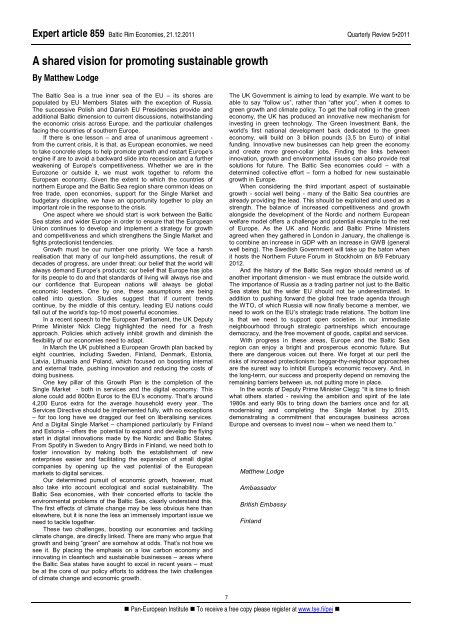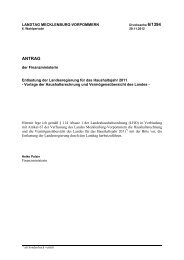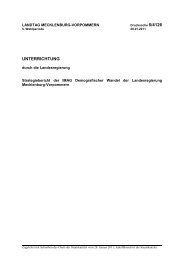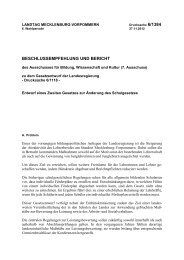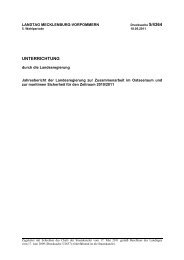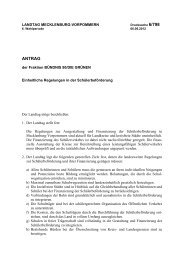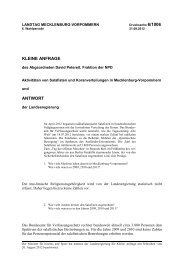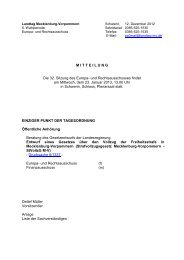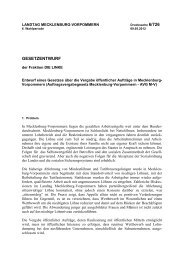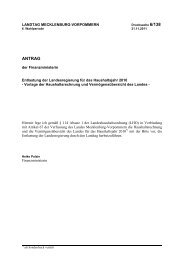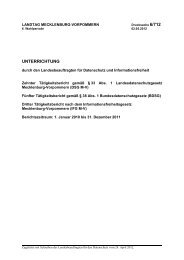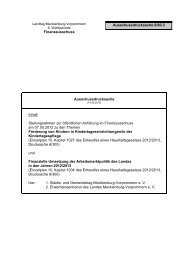Baltic Rim Economies - Baltic Port List
Baltic Rim Economies - Baltic Port List
Baltic Rim Economies - Baltic Port List
Create successful ePaper yourself
Turn your PDF publications into a flip-book with our unique Google optimized e-Paper software.
Expert article 859 <strong>Baltic</strong> <strong>Rim</strong> <strong>Economies</strong>, 21.12.2011 Quarterly Review 5�2011<br />
A shared vision for promoting sustainable growth<br />
By Matthew Lodge<br />
The <strong>Baltic</strong> Sea is a true inner sea of the EU – its shores are<br />
populated by EU Members States with the exception of Russia.<br />
The successive Polish and Danish EU Presidencies provide and<br />
additional <strong>Baltic</strong> dimension to current discussions, notwithstanding<br />
the economic crisis across Europe, and the particular challenges<br />
facing the countries of southern Europe.<br />
If there is one lesson – and area of unanimous agreement -<br />
from the current crisis, it is that, as European economies, we need<br />
to take concrete steps to help promote growth and restart Europe’s<br />
engine if are to avoid a backward slide into recession and a further<br />
weakening of Europe’s competitiveness. Whether we are in the<br />
Eurozone or outside it, we must work together to reform the<br />
European economy. Given the extent to which the countries of<br />
northern Europe and the <strong>Baltic</strong> Sea region share common ideas on<br />
free trade, open economies, support for the Single Market and<br />
budgetary discipline, we have an opportunity together to play an<br />
important role in the response to the crisis.<br />
One aspect where we should start is work between the <strong>Baltic</strong><br />
Sea states and wider Europe in order to ensure that the European<br />
Union continues to develop and implement a strategy for growth<br />
and competitiveness and which strengthens the Single Market and<br />
fights protectionist tendencies.<br />
Growth must be our number one priority. We face a harsh<br />
realisation that many of our long-held assumptions, the result of<br />
decades of progress, are under threat: our belief that the world will<br />
always demand Europe’s products; our belief that Europe has jobs<br />
for its people to do and that standards of living will always rise and<br />
our confidence that European nations will always be global<br />
economic leaders. One by one, these assumptions are being<br />
called into question. Studies suggest that if current trends<br />
continue, by the middle of this century, leading EU nations could<br />
fall out of the world’s top-10 most powerful economies.<br />
In a recent speech to the European Parliament, the UK Deputy<br />
Prime Minister Nick Clegg highlighted the need for a fresh<br />
approach. Policies which actively inhibit growth and diminish the<br />
flexibility of our economies need to adapt.<br />
In March the UK published a European Growth plan backed by<br />
eight countries, including Sweden, Finland, Denmark, Estonia,<br />
Latvia, Lithuania and Poland, which focused on boosting internal<br />
and external trade, pushing innovation and reducing the costs of<br />
doing business.<br />
One key pillar of this Growth Plan is the completion of the<br />
Single Market - both in services and the digital economy. This<br />
alone could add 800bn Euros to the EU’s economy. That’s around<br />
4,200 Euros extra for the average household every year. The<br />
Services Directive should be implemented fully, with no exceptions<br />
– for too long have we dragged our feet on liberalising services.<br />
And a Digital Single Market – championed particularly by Finland<br />
and Estonia – offers the potential to expand and develop the flying<br />
start in digital innovations made by the Nordic and <strong>Baltic</strong> States.<br />
From Spotify in Sweden to Angry Birds in Finland, we need both to<br />
foster innovation by making both the establishment of new<br />
enterprises easier and facilitating the expansion of small digital<br />
companies by opening up the vast potential of the European<br />
markets to digital services.<br />
Our determined pursuit of economic growth, however, must<br />
also take into account ecological and social sustainability. The<br />
<strong>Baltic</strong> Sea economies, with their concerted efforts to tackle the<br />
environmental problems of the <strong>Baltic</strong> Sea, clearly understand this.<br />
The first effects of climate change may be less obvious here than<br />
elsewhere, but it is none the less an immensely important issue we<br />
need to tackle together.<br />
These two challenges, boosting our economies and tackling<br />
climate change, are directly linked. There are many who argue that<br />
growth and being “green” are somehow at odds. That’s not how we<br />
see it. By placing the emphasis on a low carbon economy and<br />
innovating in cleantech and sustainable businesses – areas where<br />
the <strong>Baltic</strong> Sea states have sought to excel in recent years – must<br />
be at the core of our policy efforts to address the twin challenges<br />
of climate change and economic growth.<br />
7<br />
The UK Government is aiming to lead by example. We want to be<br />
able to say “follow us”, rather than “after you”, when it comes to<br />
green growth and climate policy. To get the ball rolling in the green<br />
economy, the UK has produced an innovative new mechanism for<br />
investing in green technology. The Green Investment Bank, the<br />
world’s first national development back dedicated to the green<br />
economy, will build on 3 billion pounds (3,5 bn Euro) of initial<br />
funding. Innovative new businesses can help green the economy<br />
and create more green-collar jobs. Finding the links between<br />
innovation, growth and environmental issues can also provide real<br />
solutions for future. The <strong>Baltic</strong> Sea economies could – with a<br />
determined collective effort – form a hotbed for new sustainable<br />
growth in Europe.<br />
When considering the third important aspect of sustainable<br />
growth - social well being - many of the <strong>Baltic</strong> Sea countries are<br />
already providing the lead. This should be exploited and used as a<br />
strength. The balance of increased competitiveness and growth<br />
alongside the development of the Nordic and northern European<br />
welfare model offers a challenge and potential example to the rest<br />
of Europe. As the UK and Nordic and <strong>Baltic</strong> Prime Ministers<br />
agreed when they gathered in London in January, the challenge is<br />
to combine an increase in GDP with an increase in GWB (general<br />
well being). The Swedish Government will take up the baton when<br />
it hosts the Northern Future Forum in Stockholm on 8/9 February<br />
2012.<br />
And the history of the <strong>Baltic</strong> Sea region should remind us of<br />
another important dimension - we must embrace the outside world.<br />
The importance of Russia as a trading partner not just to the <strong>Baltic</strong><br />
Sea states but the wider EU should not be underestimated. In<br />
addition to pushing forward the global free trade agenda through<br />
the WTO, of which Russia will now finally become a member, we<br />
need to work on the EU’s strategic trade relations. The bottom line<br />
is that we need to support open societies in our immediate<br />
neighbourhood through strategic partnerships which encourage<br />
democracy, and the free movement of goods, capital and services.<br />
With progress in these areas, Europe and the <strong>Baltic</strong> Sea<br />
region can enjoy a bright and prosperous economic future. But<br />
there are dangerous voices out there. We forget at our peril the<br />
risks of increased protectionism: beggar-thy-neighbour approaches<br />
are the surest way to inhibit Europe’s economic recovery. And, in<br />
the long-term, our success and prosperity depend on removing the<br />
remaining barriers between us, not putting more in place.<br />
In the words of Deputy Prime Minister Clegg: “It is time to finish<br />
what others started - reviving the ambition and spirit of the late<br />
1980s and early 90s to bring down the barriers once and for all,<br />
modernising and completing the Single Market by 2015,<br />
demonstrating a commitment that encourages business across<br />
Europe and overseas to invest now – when we need them to.”<br />
Matthew Lodge<br />
Ambassador<br />
British Embassy<br />
Finland<br />
� Pan-European Institute � To receive a free copy please register at www.tse.fi/pei �


